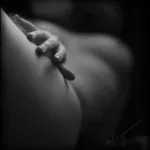There Was a Time I Thought I Had One
I used to think I had a sexuality. Like a wallet. Like a passport. Like something, I could carry around, present on demand to prove I belonged somewhere.
Straight. Married. Monogamous. Male.
I carried those labels like holy credentials, like keys to the kingdom. But they never quite fit. They chafed. They left marks.
They cracked and eventually, they began to fall away, not because I deconstructed them – although it started out that way – but because desire began to speak in a voice I could no longer ignore.
It didn’t whisper. It sang, it reverberated through my bones.
Sexuality as the Stranger Who Knows My Name
Desire showed up not as theory, not as sin, not as identity. It showed up in the middle of the night, uninvited and holy. It moved like a stranger who seemed to know my name before I ever spoke it.
This is not about having a sexuality.
This is about being called by one.
And the voice that calls?
It doesn’t flatter. It doesn’t comfort.
It unravels, unfolds; Unmasks and unmakes.
Institutions Need Stability. But Desire Doesn’t Care.
The church loves categories. The state loves checkboxes. Therapists love diagnoses. And yes, even progressives love acronyms and micro-labels. Everything must be named, mapped, filed. These institutions need sexuality to be a stable category because their survival depends on control. But desire doesn’t file paperwork. It slips between definitions, lives in contradiction, and laughs at our certainty while refusing to play by any rules.
Sexuality isn’t a static possession, a stable core, a fixed identity you discover and defend. It’s a trembling, a mystery slippery and wet, it arrives without permission and refuses to sit still. It resists mastery. Mocking our spreadsheets, theories, ideologies and systematic theologies.
It’s not a “thing.”
It’s an event.
It happens to us.
It calls us into a becoming we cannot predict or control.
This is why the theoerotic is not theology about sex—it is not even theology having sex.
It is the event, the perichoretic happening of divine bodies touching, melting, unravelling and becoming. It’s the touch, the thrust and the gasp.
Breath in.
Breath out.
This Is Not a Crisis. It Is a Liturgy.
Desire is older than language. It erupts. It disturbs. It calls without ever introducing itself politely. It doesn’t ask for our permission or wait for the right time. It arrives as sweat, breath, ache, yearning. It is the ghost that haunts touch. The hymn that trembles just beneath your skin.
When desire arrives, it’s not interested in tidying up your doctrines or leaving your marriage untouched. It’s not concerned with your spiritual reputation.
It is Jacob’s angel at midnight, and it will wrestle you until your name changes.
It is Pentecost fire on your tongue and in your body.
It is the sacrament of losing your centre.
It is not a problem to be solved. It is a sacred liturgy. A holy rite of undoing. A sacred invitation to surrender and replace certainty with incarnation.
The Theoerotic as Sacred Insistence
Caputo says: “It does not exist. It insists.”
And I say: Yes.
Oh my god, yes, yes. Come desire. Come flame.
I am coming …
Because the theoerotic does not knock politely.
It insists.
It presses.
It seduces.
In queer theology—and in lived queer experience—this is not a theoretical idea. It is survival. It is the art of a perichoretic dance between fixed forms, inhabiting bodies as wild as the breath who brooded over the tehom – the primordial deep. To be queer is not just to desire differently. It is to resist the thingification of being itself.
The theoerotic insists: this isn’t about who you’re attracted to. It’s about being interrupted by the holy. It’s about the fire that doesn’t ask which direction it should burn.
God does not merely tolerate desire.
God rides desire like a chariot of flame.
It doesn’t ask, “Who are you?”
It says, “Become.”
What would happen if we let go of needing to know our sexuality in favour of letting it speak?
What if, instead of demanding it tell us who we are, we allowed it to call us into who we are becoming?
Remember
You don’t have a sexuality. You are being summoned by something too sacred to be named and too alive to be held. What we call “sexuality” is the place where the divine refuses to stay in heaven and instead climbs under your skin.
This is not self-expression.
This is divine possession.
- Theoerotics!?
- Embracing the Theoerotic: Where Your Deepest Desires Kiss the Divine
- The Call That Won’t Let Go — When Sexuality Becomes a Voice, Not a Thing
- The Illusion of Having a Sexuality — When Desire Unmakes the Self
- Reclaiming Erotic Love as Theological Resistance
- Communion in the Flesh — Sacramental Theoerotics
- The Ache That Opens the World — The Theoerotic Longing for the Divine







